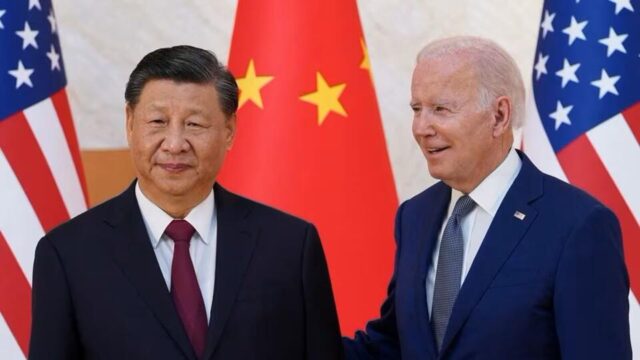OPINION: Relations between the United States and China have sunk so low that the mere fact that President Biden met with Chinese President Xi Jinping in California this week seems like a breakthrough.
By the Washington Post Editorial Board
RELATIONS between the United States and China have sunk so low that the mere fact that President Biden met with Chinese President Xi Jinping in California this week seems like a breakthrough. Even with few formal agreements announced, dialogue is preferable to name-calling, and regular communication is better than conflict.
But applying such a low bar would sell short the summit’s achievements. Yes, simply restoring in-person talks between the American and Chinese presidents is critical. Mr Biden later told reporters the two leaders agreed to telephone each other when needed. That’s especially important with Mr Xi, who, in his third term, has amassed vastly more power than his immediate predecessors and has centralized almost all decision-making. But this summit also brought real progress that shouldn’t be overlooked.
Crucially, Mr Biden eschewed the notion of decoupling the US and Chinese economies, something that would be as difficult as it would be economically painful, given how the two are interlinked. Trade measures ought to be limited — to ensure, for example, that China’s military and security apparatus is blocked from access to the United States’ most sensitive technology and that American consumers are not buying products linked to forced labour.
But Mr Biden is correct in pursuing robust diplomatic and economic engagement with China. Agreeing where the two countries can and disagreeing where they must is better policy than disengagement or, worse, outright confrontation. The United States learned this lesson during the Cold War, ramping up talks with the Soviet Union after the nearly catastrophic Cuban missile crisis, even when the Soviets were more menacing than China is now.
Mr Xi, who lately has struck a more conciliatory tone after years of combative rhetoric, has domestic reasons for wanting to cool tensions. China’s explosive economic growth of the past few decades has been slowing. Foreign investment in China in the third quarter of this year turned negative for the first time since the 1990s, when records began to be kept.
Mr Xi is responsible for many of the problems; he clung to an impractical “zero Covid” isolation strategy for far too long, and his government is bolstering inefficient state companies while restricting private enterprises. But Mr Xi seems to recognise, as Mr Biden does, that having the relationship in free fall was in neither country’s interest.
Most important, Mr Biden and Mr Xi agreed to improve bilateral military crisis management by restoring direct ties between the countries’ armed forces. Following recent near misses between American and Chinese ships and aircraft in the contested South China Sea, and an actual collision between a Chinese coast guard vessel and a Philippine ship off the disputed Second Thomas Shoal, the danger of an actual clash, unintended or not, was high.
Also, Taiwan – a bastion of freedom off China’s coast that Beijing claims is a breakaway province, and which has a defensive security relationship with the United States – is scheduled to hold a presidential election next year. China has been ramping up its military maneuvers in the Taiwan Strait to try to influence the outcome. So resuming crisis communications between the United States and China, even as the United States backs up Taiwan, is vital.
Mr Xi also agreed to take steps to regulate the flow from China of fentanyl and its chemical precursors. This is less promising than it sounds, since China has made the same promises before, in 2016 and 2018. Put that in the category of “Believe it when it happens.”
Some in the United States will say any agreement with China is worthless. With a US presidential election coming next year, expect critics to accuse Mr Biden of appeasing China, pointing to Beijing’s military build-up and provocations, the expansion of its nuclear arsenal, and its close friendships with Russia, Iran and North Korea.
Some might also mention China’s abysmal human rights record. China’s repression of its Uyghur minority in Xinjiang continues unabated, with credible new reports of Uyghurs being coerced into involuntary jobs in state-owned factories — that is, forced labour. Beijing’s curtailing of freedoms in Hong Kong has been unrelenting, with the city’s once-vaunted judicial system weaponised against political opponents. And China remains one of the world’s most profligate jailers of journalists and human rights lawyers.
No American leader can dismiss these concerns. US relations with China can never be normal as long as Beijing remains a bellicose and confrontational military power that tries to bully its neighbours, represses its own people and ignores international norms and treaties.
But engaging with China is better than disengagement or trying to decouple, which would hurt growth on both sides of the Pacific and raise the likelihood of conflict. Dealing with China is a delicate balancing act. Yet a recalibration based on reality, not hyperbole, will make the world a bit safer.
– THE WASHINGTON POST








